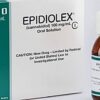The newest generation of oral contraceptive pills may help to reduce the risk of ovarian cancer in young women. Prior research on older contraceptives, which contain higher levels of estrogens and older progestins, showed that they were effective in reducing ovarian cancer risk, though there was uncertainty whether this also held true for newer contraceptives. Researchers looked at data on 1.9 million Danish women who were categorized as either never having used contraceptives, current or recent users (up to one year after stopping use) and former users (more than a year since use). Women who never used contraception had more than twice the risk of developing ovarian cancer compared with women that were using contraception or had used it. Authors noted the study was observational in nature, so they can’t make conclusions about cause and effect. Posted September 26, 2018. Via BMJ.
The newest pain medication Lyrica (pregabalin) is no more effective than a placebo in lessening chronic pain following a traumatic nerve injury, according to a new study. Although Lyrica is not approved for this purpose, many doctors prescribe it to patients after car accidents, falls, injuries and knee or hip replacements. Researchers followed 539 people who were experiencing nerve pain. Half were given Lyrica and the other half a placebo. In patients that experienced a traumatic nerve injury, both groups reported a lowering of pain symptoms during the study, though it wasn’t any greater in those taking Lyrica. Researchers, however, did find that those participants whose pain resulted from surgery had better pain relief from Lyrica compared with a placebo. Posted September 24, 2018. Via Journal of Neurology.
Newest information present that Cognitive behavioral therapy (CBT), delivered online, can be an effective way to treat insomnia as well as improve other aspects of a person’s health– and without the side effects of medication. Researchers enrolled about 1,700 people with insomnia in their study. Half received digital CBT and half received sleep hygiene education. Digital CBT was found to improve one’s ability to do daily activities only modestly better than via sleep hygiene education. However, CBT led to a larger improvement in sleep-related quality of life compared with the sleep education. One limitation of the study is that only 58% of those in the CBT group completed 4 or more sessions. The study was also sponsored by Big Health Ltd, the developer of the digital CBT program. Posted September 25, 2018. Via JAMA Psychiatry.






